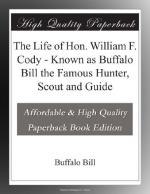While both armies were drawn up in skirmish line near Fort Scott, Kansas, two men on horseback were seen rapidly leaving the Confederate lines, and suddenly they made a dash towards us. Instantly quick volleys were discharged from the Confederates, who also began a pursuit, and some five hundred shots were fired at the flying men. It was evident that they were trying to reach our lines, but when within about a quarter of a mile of us, one of them fell from his horse to rise no more. He had been fatally shot. His companion galloped on unhurt, and seven companies of our regiment charged out and met him, and checked his pursuers. The fugitive was dressed in Confederate uniform, and as he rode into our lines I recognized him as Wild Bill, the Union scout. He immediately sought Generals Pleasanton and McNiel, with whom he held a consultation. He told them that although Price made a bold showing on the front, by bringing all his men into view, yet he was really a great deal weaker than the appearance of his lines would indicate; and that he was then trying to cross a difficult stream four miles from Fort Scott.
It was late in the afternoon, but General Pleasanton immediately ordered an advance, and we charged in full force upon the rear of Price’s army, and drove it before us for two hours.
If Wild Bill could have made his successful dash into our lines earlier in the day, the attack would have been made sooner, and greater results might have been expected. The Confederates had suspected him of being a spy for two or three days, and had watched him too closely to allow an opportunity to get away from them sooner. His unfortunate companion who had been shot, was a scout from Springfield, Missouri, whose name I cannot now remember.
From this time on, Wild Bill and myself continued to scout together until Price’s army was driven south of the Arkansas River and the pursuit abandoned. We then returned to Springfield, Missouri, for a rest and for supplies, and Wild Bill and myself spent two weeks there in “having a jolly good time,” as some people would express it.
CHAPTER XII.
A WEDDING.
It was during the winter of 1864-65, while I was on detached service at military headquarters, at St. Louis, that I became acquainted with a young lady named Louisa Frederici, whom I greatly admired and in whose charming society I spent many a pleasant hour. The war closing in 1865, I was discharged, and after a brief visit at Leavenworth I returned to St. Louis, having made up my mind to capture the heart of Miss Frederici, whom I now adored above any other young lady I had ever seen. Her lovely face, her gentle disposition and her graceful manners won my admiration and love; and I was not slow in declaring my sentiments to her. The result was that I obtained her consent to marry me in the near future, and when I bade her good-bye I considered myself one of the happiest of men.




